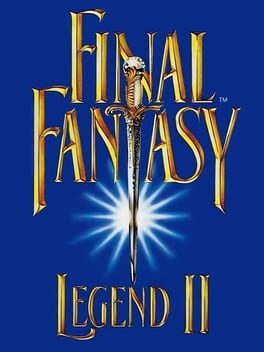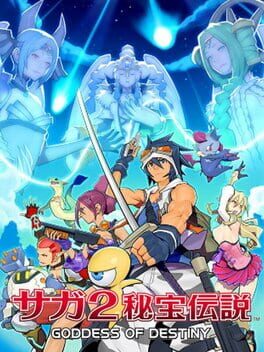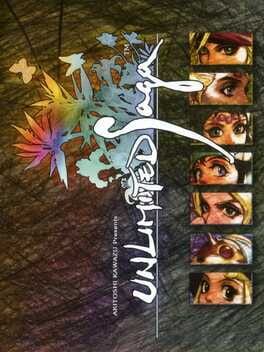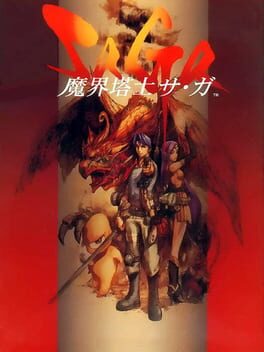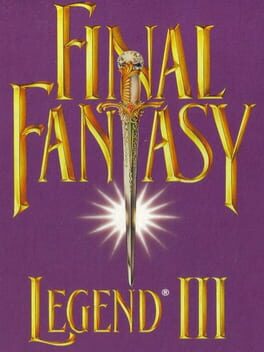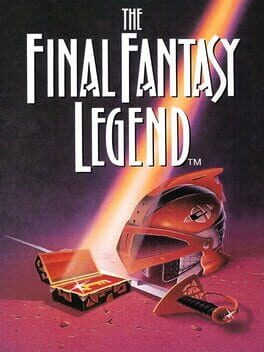

The Final Fantasy Legend series continues! In this classic RPG adventure, you are on a quest to reunite with your father. In order to find your father, you must travel far and wide to find the scattered fragments of a mystical force, known as Magi. Your quest takes you to several mysterious lands filled with caves, temples, enemy bases, ancient Japanese castles, and much more. Many of the worlds are filled with quirky inhabitants, such as the world of giants. Another world praises beauty but banishes ugliness. You can choose four heroes to accompany you in your journey. Choose from humans, robots, and even monsters. As the game progresses, you will encounter additional characters that may join your party.
Also in series
Reviews View More
It was almost a year ago that I played through the original SaGa on the Switch trilogy collection like this. I wasn’t exactly not enjoying my time with the first hour or so I dipped into SaGa 2 at the time, but I was just too burned out on SaGa to play any more of it at the time. With my recently playing through Romancing SaGa, I felt it was high time I fill the gap in my play history and experience the game that came between the two. It took me roughly 30~35 hours (my best guess) over the course of a week to play through the Japanese version of the game via the Switch collection without using the speed up features the collection provides.
Like with SaGa 1, the second game’s premise is one of gods and legends. Long, long ago, the gods scattered seventy-seven hidden treasures throughout the world (MAGI in English). They were objects of great power, and it was said that whomever collected them all would become the new god of the world. Many have tried throughout the ages, but none have succeeded. The opening of the game finds you, the main character, asleep in your room until you’re suddenly awakened by your father. He gives you one of the hidden treasures and leaps out the window into the night, on a journey he never returns from. Flashing forward a good few years, you decide to pick three of your closest friends and leave your tiny village on a quest to find your long lost father and see just what is it he’s been getting up to all these years.
Even after playing through the Last Bible GameBoy games a couple years back, I am still routinely surprised at the length and quality of RPG stories on this console. While it’s hardly something textually to rival 16-bit contemporaries, SaGa 2 is quite a competently done little RPG that feels like it’d be right at home on an 8-bit console. The dialogue writing is funny and clever, and the story paints an interesting and engaging picture of the dangerous effects of self-interested leaders and the damaging effects they can have on the world. Even though your four player characters are just generated by you, the little quips and story beats surrounding especially the main character were ones I found very fun, and this game is definitely more than just its mechanics (as I’ve always viewed this series to be).
On the topic of that created party, just like in the first SaGa, you create a party of four adventurers to go out and save the world. Also like in the last game, you have several races with very similar functions: Humans (who are the all-rounders of the game and excel in physical weapons), Espers (who are similar to humans but learn spells), Monsters (who don’t have natural stat growths and instead change into defeated enemies by consuming their meat after battle), and the new addition of Robots (who also lack natural stat growths and instead have their stats defined by the equipment they’re presently carrying). Monsters are still of dubious usefulness, and that was reflected in my party choice of two Espers, a Human, and a Robot, but Robots are a neat and interesting new choice as physical weapon users.
However, though the pieces you have to play with seem very similar, the actual implementation of these systems is drastically improved. Just about all weapons still have weapon durability, sure, but no longer do Humans only stat-up by using items bought in stores, and no longer are Espers’ power levels subject to random stat growths and reductions. Instead, Humans and Espers now always have a chance after battle to have their max HP increase, and their strength, defense, speed, and magic power have a chance to increase based on the weapon(s)/move(s) they used in battle. Using a speed-focused weapon has a chance to raise your speed, using a spell has a chance to increase your magic power, and so on. Using higher value weapons against higher powered targets gets you a better chance to level, so if you do like I did and grind exclusively against wimpy enemies, your final play time will likely look a lot like mine XD. Additionally, Espers no longer randomly lose and gain any spell like they used to either. Now it’s always the bottom spell on their list that’s replaced, and they always tell you when the spell is replaced as well, so you no longer need to constantly check your Espers’ stats and spell list after every single random battle like you had to in the first game.
However, even if you don’t play it safe and grind like I did (I reckon I did like 15-ish total hours of grinding), the way stat growths work is still decidedly imperfect. Battles tend to be quite short, so each character will likely get one turn, if that, and so you’ll likely be focusing on one stat at a time whether you intend to or not. This means that characters who happen to be slower (like my male Esper party member) will likely end up significantly weaker than their peers who happen to go first, and that’s especially true with just how dominant magic once again is through the first half or so of the game. Speed is also essential to win these rocket-tag battles (bosses and otherwise), and going back to grind in a safe place for speed and/or magic power will almost certainly be a part of your playthrough as it was in mine.
While the basic quality of life features have been improved massively compared to the first SaGa, just how non-linear and imperfect an experience grinding can be is nonetheless still quite frustrating, and I wouldn’t blame anyone for calling SaGa 2 crushingly boring at times as a result. It’s something that comes with the territory for lots of these old 8-bit RPGs, and it’s something that is something you just need to have to accept you’ll have to deal with upon starting this game. It’s something I certainly appreciate Romancing SaGa’s stat growth systems much more after experiencing, for sure, but while I didn’t exactly have a bad time with this game (as the grinding is mindless and simple enough that it made for a fine background activity while doing other stuff), this isn’t exactly a quick and breezy time I’d see myself playing through again any time soon.
The aesthetics are very much like SaGa 1’s, but they’re still very nice. Background effects in environments are very nice, and the monster sprites in particular are incredibly charming. I can’t begin to count how many times I took a screenshot of a remarkably goofy looking enemy and sent it to my friends to giggle about how great and/or weird they looked x3. Something else not to be overlooked is the music. Though there aren’t terribly many music tracks in this game, the tracks that are here are really good (with the final boss’s theme being a stand-out favorite I immediately shared with several friends~). SquareSoft once again shows why they were some of the best in the business by saving new and more dynamic tracks for when they’ll have the most impact.
Verdict: Hesitantly Recommended. As far as 8-bit RPGs go, this is probably near the top of the pile as far as base enjoyability goes. Sure, it does have some pretty bad grinding problems, but given how many common problems of 8-bit RPGs (such as a love for instant-death magic) that this game lacks, this is a much easier game to recommend than most from its era. If you’re interested in something a bit out of the ordinary and don’t mind some turn-based RPG grinding, then this is a great game to spend your time with. However, if you’re someone who prefers a more straightforward RPG experience and doesn’t have much patience for grinding, then this game is definitely not going to be the one to make a believer out of you ^^;.
Like with SaGa 1, the second game’s premise is one of gods and legends. Long, long ago, the gods scattered seventy-seven hidden treasures throughout the world (MAGI in English). They were objects of great power, and it was said that whomever collected them all would become the new god of the world. Many have tried throughout the ages, but none have succeeded. The opening of the game finds you, the main character, asleep in your room until you’re suddenly awakened by your father. He gives you one of the hidden treasures and leaps out the window into the night, on a journey he never returns from. Flashing forward a good few years, you decide to pick three of your closest friends and leave your tiny village on a quest to find your long lost father and see just what is it he’s been getting up to all these years.
Even after playing through the Last Bible GameBoy games a couple years back, I am still routinely surprised at the length and quality of RPG stories on this console. While it’s hardly something textually to rival 16-bit contemporaries, SaGa 2 is quite a competently done little RPG that feels like it’d be right at home on an 8-bit console. The dialogue writing is funny and clever, and the story paints an interesting and engaging picture of the dangerous effects of self-interested leaders and the damaging effects they can have on the world. Even though your four player characters are just generated by you, the little quips and story beats surrounding especially the main character were ones I found very fun, and this game is definitely more than just its mechanics (as I’ve always viewed this series to be).
On the topic of that created party, just like in the first SaGa, you create a party of four adventurers to go out and save the world. Also like in the last game, you have several races with very similar functions: Humans (who are the all-rounders of the game and excel in physical weapons), Espers (who are similar to humans but learn spells), Monsters (who don’t have natural stat growths and instead change into defeated enemies by consuming their meat after battle), and the new addition of Robots (who also lack natural stat growths and instead have their stats defined by the equipment they’re presently carrying). Monsters are still of dubious usefulness, and that was reflected in my party choice of two Espers, a Human, and a Robot, but Robots are a neat and interesting new choice as physical weapon users.
However, though the pieces you have to play with seem very similar, the actual implementation of these systems is drastically improved. Just about all weapons still have weapon durability, sure, but no longer do Humans only stat-up by using items bought in stores, and no longer are Espers’ power levels subject to random stat growths and reductions. Instead, Humans and Espers now always have a chance after battle to have their max HP increase, and their strength, defense, speed, and magic power have a chance to increase based on the weapon(s)/move(s) they used in battle. Using a speed-focused weapon has a chance to raise your speed, using a spell has a chance to increase your magic power, and so on. Using higher value weapons against higher powered targets gets you a better chance to level, so if you do like I did and grind exclusively against wimpy enemies, your final play time will likely look a lot like mine XD. Additionally, Espers no longer randomly lose and gain any spell like they used to either. Now it’s always the bottom spell on their list that’s replaced, and they always tell you when the spell is replaced as well, so you no longer need to constantly check your Espers’ stats and spell list after every single random battle like you had to in the first game.
However, even if you don’t play it safe and grind like I did (I reckon I did like 15-ish total hours of grinding), the way stat growths work is still decidedly imperfect. Battles tend to be quite short, so each character will likely get one turn, if that, and so you’ll likely be focusing on one stat at a time whether you intend to or not. This means that characters who happen to be slower (like my male Esper party member) will likely end up significantly weaker than their peers who happen to go first, and that’s especially true with just how dominant magic once again is through the first half or so of the game. Speed is also essential to win these rocket-tag battles (bosses and otherwise), and going back to grind in a safe place for speed and/or magic power will almost certainly be a part of your playthrough as it was in mine.
While the basic quality of life features have been improved massively compared to the first SaGa, just how non-linear and imperfect an experience grinding can be is nonetheless still quite frustrating, and I wouldn’t blame anyone for calling SaGa 2 crushingly boring at times as a result. It’s something that comes with the territory for lots of these old 8-bit RPGs, and it’s something that is something you just need to have to accept you’ll have to deal with upon starting this game. It’s something I certainly appreciate Romancing SaGa’s stat growth systems much more after experiencing, for sure, but while I didn’t exactly have a bad time with this game (as the grinding is mindless and simple enough that it made for a fine background activity while doing other stuff), this isn’t exactly a quick and breezy time I’d see myself playing through again any time soon.
The aesthetics are very much like SaGa 1’s, but they’re still very nice. Background effects in environments are very nice, and the monster sprites in particular are incredibly charming. I can’t begin to count how many times I took a screenshot of a remarkably goofy looking enemy and sent it to my friends to giggle about how great and/or weird they looked x3. Something else not to be overlooked is the music. Though there aren’t terribly many music tracks in this game, the tracks that are here are really good (with the final boss’s theme being a stand-out favorite I immediately shared with several friends~). SquareSoft once again shows why they were some of the best in the business by saving new and more dynamic tracks for when they’ll have the most impact.
Verdict: Hesitantly Recommended. As far as 8-bit RPGs go, this is probably near the top of the pile as far as base enjoyability goes. Sure, it does have some pretty bad grinding problems, but given how many common problems of 8-bit RPGs (such as a love for instant-death magic) that this game lacks, this is a much easier game to recommend than most from its era. If you’re interested in something a bit out of the ordinary and don’t mind some turn-based RPG grinding, then this is a great game to spend your time with. However, if you’re someone who prefers a more straightforward RPG experience and doesn’t have much patience for grinding, then this game is definitely not going to be the one to make a believer out of you ^^;.
I am so serious when I say play this game RIGHT NOW
It's an awesome, nifty little game with an interesting world you'll want to get lost in. Even for a black & white Gameboy game, this game goes HARD
It strives in its simplicity. There's little dialogue and character moments, and one of the best parts of the game is that you can pick what characters to bring with you. They all have perks and drawbacks, and part of the fun is learning how they work (which it has a pretty fascinating weapon/magic/equipment mechanic!! its an older game, so playing this with a guide is 100% recommended for sure)
Not only that, but the music slaps!! Some tracks can get a little repetitive, but there's some amazing songs that'll get stuck in your head in the best way and you'll find yourself humming the tunes long after setting the game down.
I've never played Final Fantasy Legend I, but you don't need to in order to understand this game. Honestly, just hop onto this one! It has its own story and lore going on so it provides you with all the context you need.
Even though the story is simple, it really tugged at my heartstrings sometimes... not to mention this has the infamous Ted Woolsy treatment, so some dialogue gets hilariously scuffed.
Boot this game up, smoke some bananas, and enjoy the ride.
It's an awesome, nifty little game with an interesting world you'll want to get lost in. Even for a black & white Gameboy game, this game goes HARD
It strives in its simplicity. There's little dialogue and character moments, and one of the best parts of the game is that you can pick what characters to bring with you. They all have perks and drawbacks, and part of the fun is learning how they work (which it has a pretty fascinating weapon/magic/equipment mechanic!! its an older game, so playing this with a guide is 100% recommended for sure)
Not only that, but the music slaps!! Some tracks can get a little repetitive, but there's some amazing songs that'll get stuck in your head in the best way and you'll find yourself humming the tunes long after setting the game down.
I've never played Final Fantasy Legend I, but you don't need to in order to understand this game. Honestly, just hop onto this one! It has its own story and lore going on so it provides you with all the context you need.
Even though the story is simple, it really tugged at my heartstrings sometimes... not to mention this has the infamous Ted Woolsy treatment, so some dialogue gets hilariously scuffed.
Boot this game up, smoke some bananas, and enjoy the ride.
